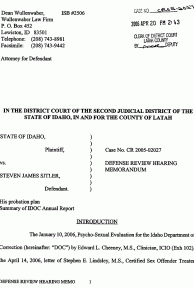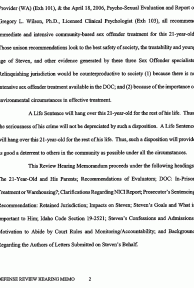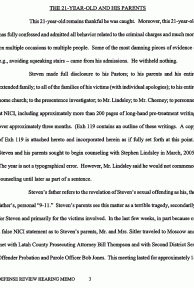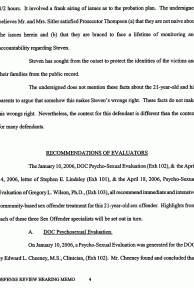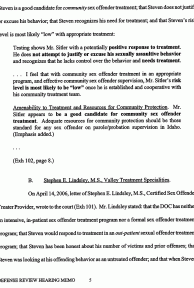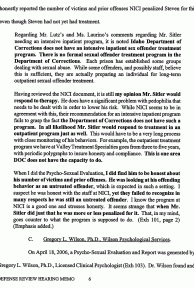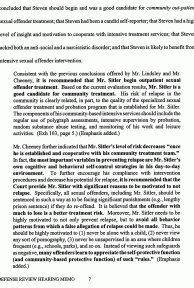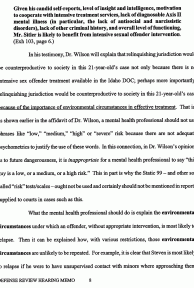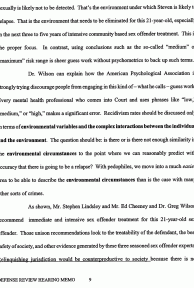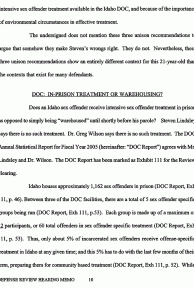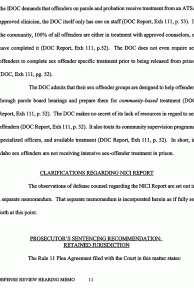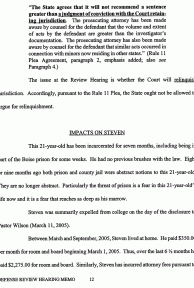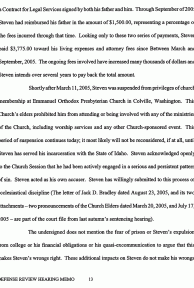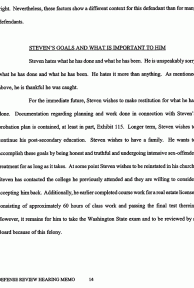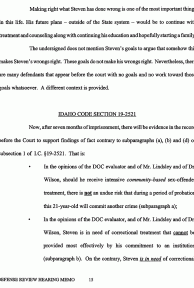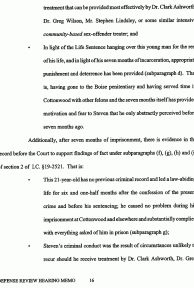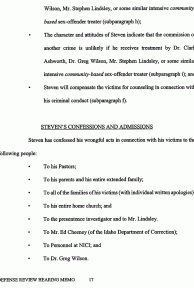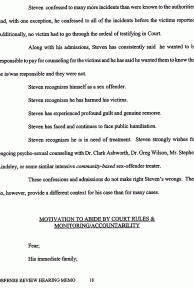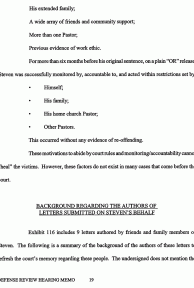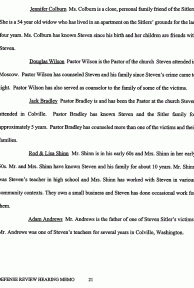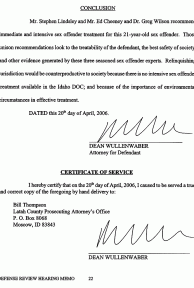Dean Wullenwaber, ISB #2506
Wullenwaber Law Firm
P. O. Box 452
Lewiston, ID 83501
Telephone: (208) 743-8981
Facsimile: (208) 743-9442
Attorney for DefendantIN THE DISTRICT COURT OF THE SECOND JUDICIAL DISTRICT OF THE
STATE OF IDAHO, IN AND FOR THE COUNTY OF LATAHSTATE OF IDAHO,
Plaintiff,vs.
STEVEN JAMES SITLER,
Defendant.His probation plan
Summary of IDOC Annual ReportCase No. CR 2005-02027
DEFENSE REVIEW HEARING MEMORANDUMINTRODUCTION
The January 10, 2006, Psycho-Sexual Evaluation for the Idaho Department of Correction (hereinafter: “DOC”) by Edward L. Cheeney, M.S., Clinician, ICIO (Exh 102), the April 14, 2006, letter of Stephen E. Lindsley, M.S., Certified Sex Offender Treater Provider (WA) (Exh 101), & the April 18, 2006, Psycho-Sexual Evaluation and Report of Gregory L. Wilson, Ph.D., Licensed Clinical Psychologist (Exh 103), all recommend immediate and intensive community-based sex offender treatment for this 21-year-old. Those unison recommendations look to the best safety of society, the treatability and young age of Steven, and other evidence generated by these three Sex Offender specialists. Relinquishing jurisdiction would be counterproductive to society (1) because there is no intensive sex offender treatment available in the DOC; and (2) because of the importance of environmental circumstances in effective treatment.
A Life Sentence will hang over this 21-year-old for the rest of his life. Thus, the seriousness of his crime will not be depreciated by such a disposition. A Life Sentence will hang over this 21-year-old for the rest of his life. Thus, such a disposition will provide as good a deterrent to others in the community as possible under all the circumstances.
This Review Hearing Memorandum proceeds under the following headings: The 21-Year-Old and His Parents; Recommendations of Evaluators; DOC: In-Prison Treatment or Warehousing?; Clarifications Regarding NICI Report; Prosecutor’s Sentencing Recommendation: Retained Jurisdiction; Impacts on Steven; Steven’s Goals and What is Important to Him; Idaho Code Section 19-2521; Steven’s Confessions and Admissions; Motivation to Abide by Court Rules and Monitoring/Accountability; and Background Regarding the Authors of Letters Submitted on Steven’s Behalf.
THE 21-YEAR-OLD AND HIS PARENTS
This 21-year-old remains thankful he was caught. Moreover, this 21-year-old has fully confessed and admitted all behavior related to the criminal charges and much more on multiple occasions to multiple people. Some of the most damning pieces of evidence — e.g., avoiding squeaking stairs — came from his admissions. He withheld nothing.
Steven made full disclosure to his Pastors; to his parents and his entire extended family; to all of the families of his victims (with individual apologies); to his entire home church; to the presentence investigator; to Mr. Lindsley; to Mr. Cheeney; to personnel at NICI, including approximately more than 200 pages of long-hand pre-treatment writing over approximately three months. (Exh 119 contains an outline of these writings. A copy of Exh 119 is attached hereto and incorporated herein as if fully set forth at this point.) Steven and his parents sought to begin counseling with Stephen Lindsley in March, 2005. The year is not a typographical error. However, Mr. Lindsley said he would not commence counseling until later as part of a sentence.
Steven’s father refers to the revelation of Steven’s sexual offending as his, the father’s, personal “9-11.” Steven’s parents see this matter as a terrible tragedy, secondarily for Steven and primarily for the victims involved. In the last few weeks, in part because of a false NICI statement as to Steven’s parents, Mr. and Mrs. Sitler traveled to Moscow and met with Latah County Prosecuting Attorney Bill Thompson and with Second District Sex Offender Probation and Parole Officer Bob Jones. This meeting lasted for approximately 1-½ hours. It involved a frank airing of issues as to the probation plan. The undersigned believes Mr. and Mrs. Sitler satisfied Prosecutor Thompson (a) that they are not naive about the issues herein and (b) that they are braced to face a lifetime of monitoring and accountability regarding Steven.
Steven has sought from the outset to protect the identities of the victims and their families from the public record.
The undersigned does not mention these facts about the 21-year-old and his parents to argue that somehow this makes Steven’s wrongs right. These facts do not make his wrongs right. Nevertheless, the context for this defendant is different than the context for many defendants.
RECOMMENDATIONS OF EVALUATORS
The January 10, 2006, DOC Psycho-Sexual Evaluation (Exh 102), & the April 14, 2006, letter of Stephen E. Lindsley (Exh 101), & the April 18, 2006, Psycho-Sexual Evaluation of Gregory L. Wilson, Ph.D., (Exh 103), all recommend immediate and intensive community-based sex offender treatment for this 21-year-old sex offender. Highlights from each of these three Sex Offender specialists will be set out in turn.
- DOC Psychosexual Evaluation.
On January 10, 2006, a Psycho-Sexual Evaluation was generated for the DOC by Edward L. Cheeney, M.S., Clinician, (Exh 102). Mr. Cheeney found and concluded that Steven is a good candidate for community sex offender treatment; that Steven does not justify or excuse his behavior; that Steven recognizes his need for treatment; and that Steven’s risk level is most likely “low” with appropriate treatment:
Testing shows Mr. Sitler with a potentially positive response to treatment. He does not attempt to justify or excuse his sexually assaultive behavior and recognizes that he lacks control over the behavior and needs treatment.
. . . I feel that with community sex offender treatment in an appropriate program, and effective community sex offender supervision, Mr. Sitler’s risk level is most likely to be “low” once he is established and cooperative with his community treatment team.
Amenability to Treatment and Resources for Community Protection. Mr. Sitler appears to be a good candidate for community sex offender treatment. Adequate resources for community protection should be those standard for any sex offender on parole/probation supervision in Idaho. (Emphasis added.)
. . .
(Exh 102, page 8.)
- Stephen E. Lindsley, M.S.. Valley Treatment Specialities.
On April 14, 2006, letter of Stephen E. Lindsley, M.S., Certified Sex Offender Treater Provider, wrote to the court (Exh 101). Mr. Lindsley stated: that the DOC has neither an intensive, in-patient sex offender treatment program nor a formal sex offender treatment program; that Steven would respond to treatment in an out-patient sexual offender treatment program; that Steven has been honest about his number of victims and prior offenses; that Steven was looking at his offending behavior as an untreated offender; and that when Steven honestly reported the number of victims and prior offenses NICI penalized Steven for this even though Steven had not yet had treatment.Regarding Mr. Lutz’s and Ms. Laurino’s comments regarding Mr. Sitler needing an intensive inpatient program, it is noted Idaho Department of Corrections does not have an intensive inpatient sex offender treatment program. There is no formal sexual offender treatment program in the Department of Corrections. Each prison has established some groups dealing with sexual abuse. While some offenders, and possibly staff, believe this is sufficient, they are actually preparing an individual for long-term outpatient sexual offender treatment.
Having reviewed the NICI document, it is still my opinion Mr. Sitler would respond to therapy. He does have a significant problem with pedophilia that needs to be dealt with in order to lower his risk. While NICI seems to be in agreement with this, their recommendation for an intensive inpatient program fails to grasp the fact the Department of Corrections does not have such a program. In all likelihood Mr. Sitler would respond to treatment in an outpatient program just as well. This would have to be a very long process with close monitoring of his behaviors. For example, the outpatient treatment program we have at Valley Treatment Specialties goes from three to five years, with periodic polygraphs to insure honesty and compliance. This is one area DOC does not have the capacity to do.
When I did the Psycho-Sexual Evaluation, I did find him to be honest about his number of victims and prior offenses. He was looking at his offending behavior as an untreated offender, which is expected in such a setting. I suspect he was honest with the staff at NICI, yet they failed to recognize in many respects he was still an untreated offender. I know the program at NICI is a good one and stresses honesty. It seems strange that when Mr. Sitler did just that he was more or less penalized for it. That, in my mind, goes counter to what the program is supposed to do. (Exh 101, page 2) (Emphasis added.)
- Gregory L. Wilson, Ph.D., Wilson Psychological Services.
On April 18, 2006, a Psycho-Sexual Evaluation and Report was generated by Gregory L. Wilson, Ph.D., Licensed Clinical Psychologist (Exh 103). Dr. Wilson found and concluded that Steven should begin and was a good candidate for community out-patient sexual offender treatment; that Steven had been a candid self-reporter; that Steven had a high level of insight and motivation to cooperate with intensive treatment services; that Steven lacked both an anti-social and a narcissistic disorder; and that Steven is likely to benefit from intensive sexual offender intervention.Consistent with the previous conclusions offered by Mr. Lindsley and Mr. Cheeney, it is recommended that Mr. Sitler begin outpatient sexual offender treatment. Based on the current evaluation results, Mr. Sitler is a good candidate for community treatment. His risk of relapse in the community is clearly related, in part, to the quality of the specialized sexual offender treatment and probation program that is established for Mr. Sitler. The components of his community-based intensive services should include the regular use of polygraph assessments, intensive supervision by probation, random substance abuse testing, and monitoring of his work and leisure activities. (Exh 103, page 5.) (Emphasis added.)
Mr. Cheeney further indicated that Mr. Sitler’s level of risk decreases “once he is established and cooperative with his community treatment team.” In fact, the most important variables in preventing relapse are Mr. Sitler’s own cognitive and behavioral self-control strategies in his day-to-day environment. To further encourage his compliance with intervention procedures and decrease his potential for relapse, it is recommended that the Court provide Mr. Sitler with significant reasons to be motivated to not relapse. Specifically, all sexual offenders, including Mr. Sitler, should be sentenced in such a way as to be facing significant punishments (e.g., lengthy prison sentence) if they do re-offend. It is believed that the offender with much to lose is a better treatment risk. Moreover, Mr. Sitler needs to be highly motivated to not only prevent relapse, but to avoid all behavior patterns from which a false allegation of relapse could be made. Thus, he should be highly motivated to (1) never be alone with a child, (2) never view any sort pornography, (3) never be unsupervised in an area where children frequent (e.g., schools, parks), and so on. Instead of viewing such safeguards as negative, many offenders learn to appreciate the self-protective function (and community-based protective function) of such “rules.” (Emphasis added.)
Given his candid self-reports, level of insight and intelligence, motivation to cooperate with intensive treatment services, lack of diagnosable Axis II mental illness (in particular, the lack of antisocial and narcissistic disorders), lack of other criminal history, and overall level of functioning, Mr. Sitler is likely to benefit from intensive sexual offender intervention. (Exh 103, page 6.)
In his testimony, Dr. Wilson will explain that relinquishing jurisdiction would be counterproductive to society in this 21-year-old’s case not only because there is no intensive sex offender treatment available in the Idaho DOC; perhaps more importantly, relinquishing jurisdiction would be counterproductive to society in this 21-year-old’s case because of the importance of environmental circumstances in effective treatment. That is, as shown earlier in the affidavit of Dr. Wilson, a mental health professional should not use phrases like “low,” “medium,” “high” or “severe” risk because there are not adequate psychometrics to justify the use of these words. In this connection, in Dr. Wilson’s opinion, as to future dangerousness, it is inappropriate for a mental health professional to say “this guy is a low, or a medium, or a high risk.” This in part is why the Static 99 — and other so-called “risk” tests/scales — ought not be used and certainly should not be mentioned in reports supplied to courts in cases such as this.
What the mental health professional should do is explain the environmental circumstances under which an offender, without appropriate intervention, is most likely to relapse. Then it can be explained how, with various restrictions, those environmental circumstances are unlikely to be repeated. For example, it is clear that Steven is most likely to relapse if he were to have unsupervised contact with minors where approaching them sexually is likely not to be detected. That’s the environment under which Steven is likely to relapse. That is the environment that needs to be eliminated for this 21-year-old, especially in the next three to five years of intensive community based sex offender treatment. This is the proper focus. In contrast, using conclusions such as the so-called “medium” or “maximum” risk range is sheer guess work without psychometrics to back up such terms.
Dr. Wilson can explain how the American Psychological Association is strongly trying discourage people from engaging in this kind of — what he calls — guess work. Every mental health professional who comes into Court and uses phrases like “low,” “medium,” or “high,” makes a significant error. Recidivism rates should be discussed only in terms of environmental variables and the complex interactions between the individual and the environment. The question should be: is there or is there not enough similarity in the environmental circumstances to the point where we can reasonably predict with accuracy that there is going to be a relapse? With pedophiles, we move into a much easier area to be able to describe the environmental circumstances than is the case with many other sorts of crimes.
As shown, Mr. Stephen Lindsley and Mr. Ed Cheeney and Dr. Greg Wilson recommend immediate and intensive sex offender treatment for this 21-year-old sex offender. Those unison recommendations look to the treatability of the defendant, the best safety of society, and other evidence generated by these three seasoned sex offender experts. Relinquishing jurisdiction would be counterproductive to society because there is no intensive sex offender treatment available in the Idaho DOC, and because of the importance of environmental circumstances in effective treatment.
The undersigned does not mention these three unison recommendations to argue that somehow they make Steven’s wrongs right. They do not. Nevertheless, these three unison recommendations show an entirely different context for this 21-year-old than the contexts that exist for many defendants.
DOC: IN-PRISON TREATMENT OR WAREHOUSING?
Does an Idaho sex offender receive intensive sex offender treatment in prison as opposed to simply being “warehoused” until shortly before his parole? Steven Lindsley says there is no such treatment. Dr. Greg Wilson says there is no such treatment. The DOC Annual Statistical Report for Fiscal Year 2005 (hereinafter: “DOC Report”) agrees with Mr. Lindsley and Dr. Wilson. The DOC Report has been marked as Exhibit 111 for the Review Hearing.
Idaho houses approximately 1,162 sex offenders in prison (DOC Report, Exh 111, p. 46). Between three of the DOC facilities, there are a total of 5 sex offender specific groups being run (DOC Report, Exh 111, p. 53). Each group is made up of a maximum of 12 participants, or 60 total offenders in sex offender specific treatment (DOC Report, Exh 111, p. 53). Thus, only about 5% of incarcerated sex offenders receive offense-specific treatment in Idaho at any given time; and this 5% has to do with the last few months of their term, preparing them for community based treatment (DOC Report, Exh 111, p. 52). While the IDOC demands that offenders on parole and probation receive treatment from an ATSA approved clinician, the DOC itself only has one on staff (DOC Report, Exh 111, p. 53). In the community, 100% of all offenders are either in treatment with approved counselors, or have completed it (DOC Report, Exh 11, p.52). The DOC does not even require sex offenders to complete sex offender specific treatment prior to being released from prison (DOC, Exh 111, pg. 52).
The DOC admits that their sex offender groups are designed to help offenders through parole board hearings and prepare them for community-based treatment (DOC Report, Exh 111, p. 52). The DOC makes no secret of its lack of resources in regard to sex offenders (DOC Report, Exh 111, p. 52). It also touts its community supervision programs, specialized officers, and available treatment (DOC Report, Exh 111, p. 52). In short, in Idaho sex offenders are not receiving intensive sex-offender treatment in prison.
CLARIFICATIONS REGARDING NICI REPORT
The observations of defense counsel regarding the NICI Report are set out in a separate memorandum. That separate memorandum is incorporated herein as if fully set forth at this point.
PROSECUTOR’S SENTENCING RECOMMENDATION:
RETAINED JURISDICTIONThe Rule 11 Plea Agreement filed with the Court in this matter states:
“The State agrees that it will not recommend a sentence greater than a judgment of conviction with the Court retaining jurisdiction. The prosecuting attorney has been made aware by counsel for the defendant that the volume and extent of acts by the defendant are greater than the investigator’s documentation. The prosecuting attorney has also been made aware by counsel for the defendant that similar acts occurred in connection with minors now residing in other states.” (Rule 11 Plea Agreement, paragraph 2, emphasis added; also see Paragraph 4.)
The issue at the Review Hearing is whether the Court will relinquish jurisdiction. Accordingly, pursuant to the Rule 11 Plea, the State ought not be allowed to argue for relinquishment.
IMPACTS ON STEVEN
This 21-year-old has been incarcerated for seven months, including being in part of the Boise prison for some weeks. He had no previous brushes with the law. Eight or nine months ago both prison and county jail were abstract notions to this 21-year-old. They are no longer abstract. Particularly the threat of prison is a fear in this 21-year-old’s life now and it is a fear that reaches as deep as his marrow.
Steven was summarily expelled from college on the day of the disclosure to Pastor Wilson (March 11, 2005).
Between March and September, 2005, Steven lived at home. He paid $350.00 per month for room and board beginning March 1, 2005. Thus, over the last 6 ½ months he paid $2,275.00 for room and board. Similarly, Steven has incurred attorney fees pursuant to a Contract for Legal Services signed by both his father and him. Through September of 2005 Steven had reimbursed his father in the amount of $1,500.00, representing a percentage of the fees incurred through that time. Looking only to these two series of payments, Steven paid $3,775.00 toward his living expenses and attorney fees since Between March and September, 2005. The ongoing fees involved have increased many thousands of dollars and Steven intends over several years to pay back the total amount.
Shortly after March 11, 2005, Steven was suspended from privileges of church membership at Emmanuel Orthodox Presbyterian Church in Colville, Washington. This Church’s elders prohibited him from attending or being involved with any of the ministries of the Church, including worship services and any other Church-sponsored event. This period of suspension continues today; it most likely will not be reconsidered, if at all, until Steven has served his incarceration with the State of Idaho. Steven acknowledged openly to the Church Session that he had been actively engaged in a serious and persistent pattern of sin. Steven acted as his own accuser. Steven has willingly submitted to this process of ecclesiastical discipline (The letter of Jack D. Bradley dated August 23, 2005, and its two attachments — two pronouncements of the Church Elders dated March 20, 2005, and July 17, 2005 — are part of the court file from last autumn’s sentencing hearing).
The undersigned does not mention the fear of prison or Steven’s expulsion from college or his financial obligations or his quasi-excommunication to argue that this makes Steven’s wrongs right. These additional impacts on Steven do not make his wrongs right. Nevertheless, these factors show a different context for this defendant than for many defendants.
STEVEN’S GOALS AND WHAT IS IMPORTANT TO HIM
Steven hates what he has done and what he has been. He is unspeakably sorry what he has done and what he has been. He hates it more than anything. As mentioned above, he is thankful he was caught.
For the immediate future, Steven wishes to make restitution for what he has done. Documentation regarding planning and work done in connection with Steven’s probation plan is contained, at least in part, Exhibit 115. Longer term, Steven wishes to continue his post-secondary education. Steven wishes to have a family. He wants to accomplish these goals by being honest and truthful and undergoing intensive sex-offender treatment for as long as it takes. At some point Steven wishes to be reinstated in his church. Steven has contacted the college he previously attended and they are willing to consider accepting him back. Additionally, he earlier completed course work for a real estate license, consisting of approximately 60 hours of class work and passing the final test therein. However, it remains for him to take the Washington State exam and to be reviewed by a Board because of this felony.
Making right what Steven has done wrong is one of the most important things in this life. His future plans — outside of the State system — would be to continue with treatment and counseling along with continuing his education and hopefully starting a family.
The undersigned does not mention Steven’s goals to argue that somehow this makes Steven’s wrongs right. These goals do not make his wrongs right. Nevertheless, there are many defendants that appear before the court with no goals and no work toward those goals whatsoever. A different context is provided.
IDAHO CODE SECTION 19-2521
Now, after seven months of imprisonment, there will be evidence in the record before the Court to support findings of fact contrary to subparagraphs (a), (b) and (d) of subsection 1 of I.C. §19-2521. That is:
- In the opinions of the DOC evaluator and of Mr. Lindsley and of Dr. Wilson, should he receive intensive community-based sex-offender treatment, there is not an undue risk that during a period of probation this 21-year-old will commit another crime (subparagraph a);
- In the opinions of the DOC evaluator, and of Mr. Lindsley and of Dr. Wilson, Steven is in need of correctional treatment that cannot be provided most effectively by his commitment to an institution (subparagraph b). On the contrary, Steven is in need of correctional treatment that can be provided most effectively by Dr. Clark Ashworth, Dr. Greg Wilson, Mr. Stephen Lindsley, or some similar intensive community-based sex-offender treater; and
- In light of the Life Sentence hanging over this young man for the rest of his life, and in light of his seven months of incarceration, appropriate punishment and deterrence has been provided (subparagraph d). That is, having gone to the Boise penitentiary and having served time in Cottonwood with other felons and the seven months itself has provided motivation and fear to Steven that he only abstractly perceived before seven months ago.
Additionally, after seven months of imprisonment, there is evidence in the record before the Court to support findings of fact under subparagraphs (f), (g), (h) and (i) of section 2 of I.C. §19-2521. That is:
- This 21-year-old has no previous criminal record and led a law-abiding life for six and one-half months after the confession of the present crime and before his sentencing; he caused no problem during his imprisonment at Cottonwood and elsewhere and substantially complied with everything asked of him in prison (subparagraph g);
- Seven’s criminal conduct was the result of circumstances unlikely to recur should he receive treatment by Dr. Clark Ashworth, Dr. Greg Wilson, Mr. Stephen Lindsley, or some similar intensive community-based sex-offender treater (subparagraph h);
- The character and attitudes of Steven indicate that the commission of another crime is unlikely if he receives treatment by Dr. Clark Ashworth, Dr. Greg Wilson, Mr. Stephen Lindsley, or some similar intensive community-based sex-offender treater (subparagraph i); and
- Steven will compensate the victims for counseling in connection with his criminal conduct (subparagraph f).
STEVEN’S CONFESSIONS AND ADMISSIONS
Steven has confessed his wrongful acts in connection with his victims to the following people:
- To his Pastors;
- To his parents and his entire extended family;
- To all of the families of his victims (with individual written apologies);
- To his entire home church; and
- To the presentence investigator and to Mr. Lindsley.
- To Mr. Ed Cheeney (of the Idaho Department of Correction);
- To Personnel at NICI; and
- To Dr. Greg Wilson.
Steven confessed to many more incidents than were known to the authorities; and, with one exception, he confessed to all of the incidents before the victims reported. Additionally, no victim had to go through the ordeal of testifying in Court.
Along with his admissions, Steven has consistently said he wanted to be responsible to pay for counseling for the victims and he has said he wanted them to know that he is/was responsible and they were not.
Steven recognizes himself as a sex offender.
Steven recognizes he has harmed his victims.
Steven has experienced profound guilt and genuine remorse.
Steven has faced and continues to face public humiliation.
Steven recognizes he is in need of treatment. Steven strongly wishes for ongoing psycho-sexual counseling with Dr. Clark Ashworth, Dr. Greg Wilson, Mr. Stephen Lindsley, or some similar intensive community-based sex-offender treater.
These confessions and admissions do not make right Steven’s wrongs. They do, however, provide a different context for his case than for many cases.
MOTIVATION TO ABIDE BY COURT RULES &
MONITORING/ACCOUNTABILITYFear;
His immediate family;
His extended family;
A wide array of friends and community support;
More than one Pastor;
Previous evidence of work ethic.
For more than six months before his original sentence, on a plain “OR” release, Steven was successfully monitored by, accountable to, and acted within restrictions set by:
- Himself;
- His family;
- His home church Pastor;
- Other Pastors.
This occurred without any evidence of re-offending.
These motivations to abide by court rules and monitoring/accountability cannot “heal” the victims. However, these factors do not exist in many cases that come before the court.
BACKGROUND REGARDING THE AUTHORS OF
LETTERS SUBMITTED ON STEVEN’S BEHALFExhibit 116 includes 9 letters authored by friends and family members of Steven. The following is a summary of the background of the authors of these letters to refresh the court’s memory regarding these people. The undersigned does not mention the wide array of concern and support for Steven by friends and family members to argue that this makes Steven’s wrongs right. This wide-ranging support does not make his wrongs right. Nevertheless, this support provides an entirely different context for this 21-year-old than for many defendants.
Dan Eby Mr. Eby is approximately 55 years old and lives in Leavenworth, WA. He is a family friend who lived in Colville for a number of years when the Sitler boys were growing up. The Eby children and the Sitlers were close friends. Steven often helped Dan with various functions including seminars and conferences (mostly for the American Heritage and home school conventions) as well helping him in his Azure food business.
Carl Anderson Mr. Anderson is a family friend and local contractor who often works for Mr. Sitler, Steven’s father. Mr. Anderson is 45 years old. He has known Steven for about ten years. Mr. Anderson has worked with Steven on the job as a contractor and has worked with him at camps and in various other settings and has instructed him in bible studies. Mr. Anderson’s two oldest sons, Henry and Austin, are good friends of Steven. Austin, the younger of the two, was Steven’s roommate in college.
Bill Kimball Mr. Kimball is a friend who works for the Sitler business. Mr. Kimball and his wife are involved in Westover Academy, a small school Steven attended. Mr. Kimball is 48 years old and has interacted with Steven in social, political, and work contexts for about the last 10 years.
Jennifer Colburn Ms. Colburn is a close, personal family friend of the Sitlers. She is a 54 year old widow who has lived in an apartment on the Sitlers’ grounds for the last four years. Ms. Colburn has known Steven since his birth and her children are friends with Steven.
Douglas Wilson Pastor Wilson is the Pastor of the church Steven attended in Moscow. Pastor Wilson has counseled Steven and his family since Steven’s crime came to light. Pastor Wilson has also served as counselor to the family of some of the victims.
Jack Bradley Pastor Bradley is and has been the Pastor at the church Steven attended in Colville. Pastor Bradley has known Steven and the Sitler family for approximately 5 years. Pastor Bradley has counseled more than one of the victims and their families.
Rod & Lisa Shinn Mr. Shinn is in his early 60s and Mrs. Shinn in her early 50s. Mr. and Mrs. Shinn have known Steven and his family for about 10 years. Mr. Shinn was Steven’s teacher in high school and Mrs. Shinn has worked with Steven in various community contexts. They own a small business and Steven has done occasional work for them.
Adam Andrews Mr. Andrews is the father of one of Steven Sitler’s victims. Mr. Andrews was one of Steven’s teachers for several years in Colville, Washington.
CONCLUSION
Mr. Stephen Lindsley and Mr. Ed Cheeney and Dr. Greg Wilson recommend immediate and intensive sex offender treatment for this 21-year-old sex offender. Those unison recommendations look to the treatability of the defendant, the best safety of society, and other evidence generated by these three seasoned sex offender experts. Relinquishing jurisdiction would be counterproductive to society because there is no intensive sex offender treatment available in the Idaho DOC; and because of the importance of environmental circumstances in effective treatment.
DATED this 20th day of April, 2006.
DEAN WULLENWABER
Attorney for DefendantCERTIFICATE OF SERVICE
I hereby certify that on the 20th day of April, 2006, I caused to be served a true and correct copy of the foregoing by hand delivery to:
Bill Thompson
Latah County Prosecuting Attorney’s Office
P. O. Box 8068
Moscow, ID 83843DEAN WULLENWABER
Steven Sitler Archive
The Truth About Moscow

